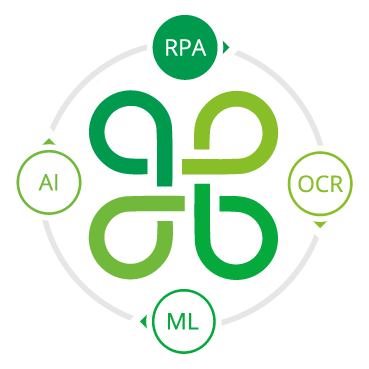Robotic Process Automation (RPA)
Harness the Power of Digital Robots to Streamline Processes and Accelerate Digital Transformation
Robotic Process Automation (RPA) is fundamental to your digital transformation journey. By leveraging “digital workers,” you can automate multiple tasks in a workflow, which supports operational efficiency and more meaningful work for your human employees.
Convinced and ready to get started on your automation journey?
What Is RPA, and How Does It Work?
RPA is a technology that uses “software robots” to automate tedious and repetitive work. RPA can emulate the actions of human users, including keystrokes, navigation, identification and extraction of data, and other movements. These robots can complete these actions quickly and without errors.
Any company’s automation journey starts with RPA. The first step is identifying parts of processes that automation can assume, from moving files and folders to extracting information to completing forms. Automation has use cases throughout enterprises in any industry.
Next, you’ll work with RPA experts to prioritize automation with the greatest effect and value. Examples include areas where substantial repetitive labor is necessary or transactions that are the same every time. These are rules-based processes that don’t need a human touch. Once you determine what to automate, technology experts build your robots, deploy them, and monitor their actions.


What Can You Do With RPA?
RPA is flexible and can impact many types of processes. It’s revolutionizing how work happens for millions of people every day. The future is automation, and RPA will put you on the path toward improvements in many areas.
Some common use cases include:
- Contact center support: Accelerate workflows with ticket tagging and classification, quick access to historical data on customers, and automated refunds
- Healthcare: Make EHR interactions less daunting by alleviating administrative burdens, which can reduce medical errors and provide greater access to patient information
- Operations: Solve data aggregation issues with RPA, which can extract data from systems and combine it into a central repository for analysis and action
- Financial activities: Simplify and speed up document-heavy workflows, including processing, contract management, reconciliation, legacy application integrations, auditing and compliance, fraud detection, and forecasting
- Recruitment and hiring: Facilitate candidate reviews for HR personnel and make onboarding of new employees seamless
- Sales processes: Ensure sellers spend more time selling by reducing admin work, such as entering data, consolidating information, and providing the most current rate cards
- Enterprise systems: Automate end-to-end processes in your ERP system to improve efficiency and productivity
RPA works for any repeatable, high-volume process that follows a consistent set of rules.
 What Are the Benefits of RPA?
What Are the Benefits of RPA?
RPA is the first step of any automation journey. By implementing it into your enterprise, you can unlock many advantages, including:
- Accelerating digital transformation efforts
- Achieving operational efficiency goals related to saving time and money
- Reducing labor, operations, and software costs with a rapid time-to-value window
- Improving the resiliency of your organization as robots scale up or down to match your workloads
- Enhancing the accuracy of the workflow, as you can eliminate much of the risk related to human error
- Strengthening compliance protocols and adherence
- Boosting the productivity of workers by giving them a personal robot assistant
- Empower your employees to be critical thinkers and problem solvers rather than repeatedly doing mundane tasks, which can improve their engagement and satisfaction
- Grow profits by automating administrative tasks that allow teams to spend more time on revenue-generating activities
RPA in Action
Automation Resources Hub
Downloadable Resources
Guides, eBooks, Infographics, White Papers, and Case Studies
Webinars
Browse by live and on-demand webinars across a wide variety of IA topics
Thought Leadership Articles
Your source for RPA and Hyperautomation thought leadership and education




